高中英语必修一第四单元概要
高一英语必修一第四单元知识点总结
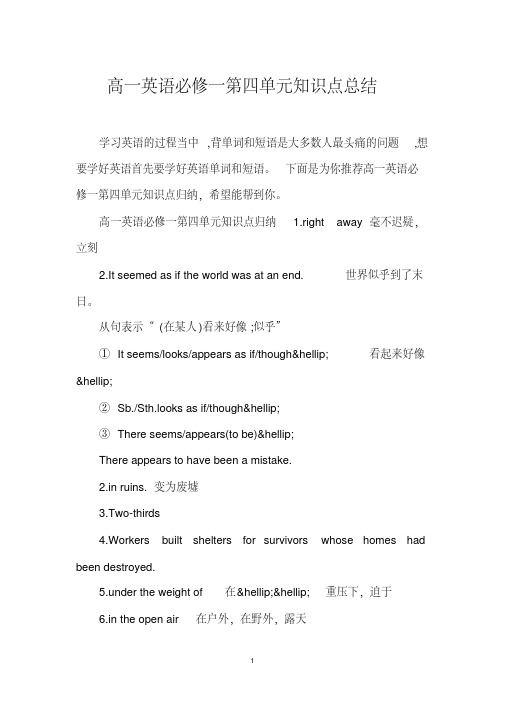
高一英语必修一第四单元知识点总结学习英语的过程当中,背单词和短语是大多数人最头痛的问题,想要学好英语首先要学好英语单词和短语。
下面是为你推荐高一英语必修一第四单元知识点归纳,希望能帮到你。
高一英语必修一第四单元知识点归纳 1.right away毫不迟疑,立刻2.It seemed as if the world was at an end.世界似乎到了末日。
从句表示“(在某人)看来好像;似乎”①It seems/looks/appears as if/though…看起来好像…②Sb./Sth.looks as if/though…③There seems/appears(to be)…There appears to have been a mistake.2.in ruins.变为废墟3.Two-thirds4.Workers built shelters for survivors whose homes had been destroyed.5.under the weight of在……重压下,迫于6.in the open air在户外,在野外,露天7.take turns to do sth依次,轮流做某事in turn依次地,轮流地8.be shocked at对……感到震惊9.be proud of以……为自豪10.express one’s thanks to sb/for sth…对/因……表示感谢11.without warning毫无预兆12.next to紧接着,相邻,次于13.get away from…避免,摆脱,离开14.disaster-hit areas灾区15.Listening to English is a very important skill because itis only when we understand what is said to us that we can have a conversation with somebody.听英语是一项很重要的技能,因为只有当我们懂得别人给我们说什么我们才能与他交谈。
高中英语 必修一第四章知识点总结(详细)
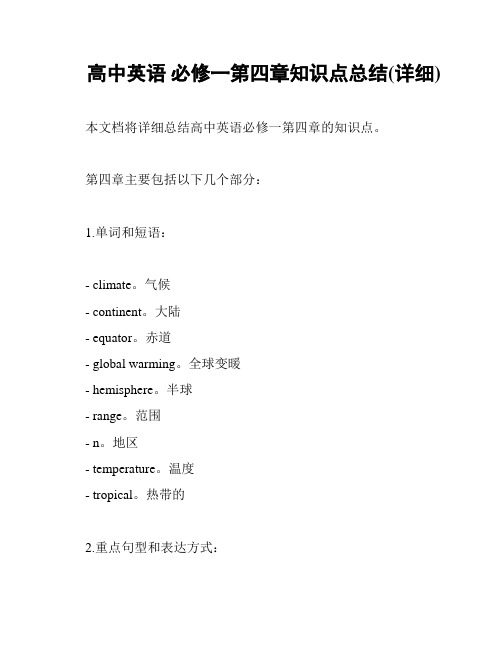
高中英语必修一第四章知识点总结(详细)本文档将详细总结高中英语必修一第四章的知识点。
第四章主要包括以下几个部分:
1.单词和短语:
- climate。
气候
- continent。
大陆
- equator。
赤道
- global warming。
全球变暖
- hemisphere。
半球
- range。
范围
- n。
地区
- temperature。
温度
- tropical。
热带的
2.重点句型和表达方式:
- What's the ___?
你的家乡气候如何?
- It's quite hot and humid in summer.
夏天非常炎热潮湿。
- ___.
这个地区的天气十分多变。
- The average temperature ranges from 20 to 30 degrees.
平均温度在20到30度之间。
3.文章内容要点:
本章主要介绍了地理和气候的相关知识。
重点包括地球的划分、地理特征和全球变暖问题。
通过研究本章,可以了解不同地区的气
候特点,掌握描述气候和天气的词汇和句型,并了解全球变暖对地
球气候的影响。
总结:通过研究第四章,我们对地理和气候有了更深入的了解。
希望同学们能够运用所学的知识,更好地认识和适应各地的气候变化。
以上是对高中英语必修一第四章的知识点进行详细总结的文档。
希望对你的研究有所帮助!
(字数:191)。
人教新课标高中英语必修一Unit 4 Earthquake知识点归纳

复数根据 of 后的名词或代词的单复数。 ¬A lot of parcels are transported to all over China during the “Double-11” festival every year.
每年双十一期间,有大量包裹运往中国各地。
¬A lot of money has been wasted for no reason.许多钱被无缘无故地浪费了。
v. 毁坏,毁灭,灭亡,使破产 ruin sb./sth.
¬Heavy smoke ruined his health.重度吸烟毁了他的健康。
【拓展】go/come to ruin 衰落,败落 fall into ruin 衰落,败落
bring sth. to ruin 使某物毁灭 bring sb. to ruin 使某人破产
15. as if=as though+句子 “好像
even if= even though+句子 “尽管”
【注意】(1)as i般过去时:与现在/将来事实相反
连系动词 look/seem/feel + as if/though +从句 虚拟语气
过去完成时:与过去事实相反
6. smelly gas 有臭味的气体
7. in the farmyard 在农家庭院 on the farm 在农场
8. too...to...太...而不能...
【拓展】表肯定:
(only/but/all/simply/just)+too+心理状态形容词/描述性形容词+to “非常”
心理状态形容词:anxious/eager/glad/pleased/thankful/delighted 等
高一英语必修一Unit4重要知识点总结(句型)外研版
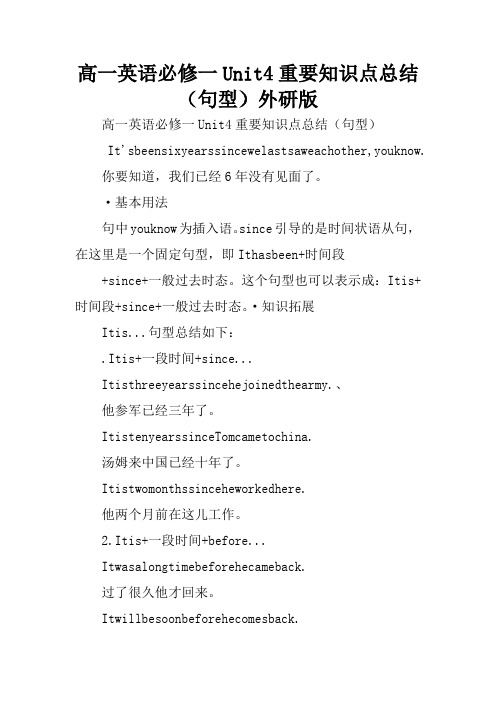
高一英语必修一Unit4重要知识点总结(句型)外研版高一英语必修一Unit4重要知识点总结(句型)It'sbeensixyearssincewelastsaweachother,youknow.你要知道,我们已经6年没有见面了。
·基本用法句中youknow为插入语。
since引导的是时间状语从句,在这里是一个固定句型,即Ithasbeen+时间段+since+一般过去时态。
这个句型也可以表示成:Itis+时间段+since+一般过去时态。
·知识拓展Itis...句型总结如下:.Itis+一段时间+since...Itisthreeyearssincehejoinedthearmy.、他参军已经三年了。
ItistenyearssinceTomcametochina.汤姆来中国已经十年了。
Itistwomonthssinceheworkedhere.他两个月前在这儿工作。
2.Itis+一段时间+before...Itwasalongtimebeforehecameback.过了很久他才回来。
Itwillbesoonbeforehecomesback.很快他就会回来了。
3.Itis+时间点+when...Itwasmidnightwhenhecameback.他半夜回来的。
AndthisisthefirsttimeI'vevisitedyourhometown.这是我第一次到你的家乡来参观。
·基本用法句型结构“This+is+the+序数词+time+that从句”中的time前面有序数词来修饰,后面的从句一般要用完成时。
如:ThisisthesecondtimethathehasbeentoBeijing.这是他第二次取北京。
·知识拓展It'stimethat....该...时候了It'shightimethat....该...时候了It'stimethatyouwenttobed.=It'stimeforyoutogotobed.到了你上床睡觉的时候了。
高中英语必修一unit4知识要点梳理ppt
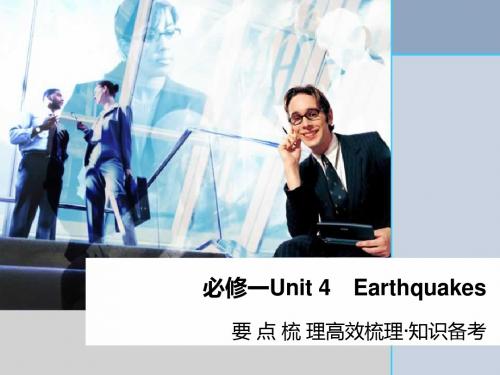
• [即学即练6] (1)Don't judge a book by its cover. • 勿以貌叏人。 • (2)Judging from/by his accent, he must be a southerner.根据 他的口音判断,他一定是个南方人。 • (3)He was judged to be the best actor of this year.他被评为今 年的最佳男演员。 • • • • • • • • 7.right away立刻,马上 (1)表示“立刻,马上”的短语 without delay/right now/immediately/at once/in no time /right off (2)比较right away/right now right away“立刻,马上”,相当于at once, in no time。 right now“立即,马上;此时此刻”,后一意义比now 的语气强,相当于at this very moment。
• • • • • • • • • •
• • • • • • •
3.injure vt. 损害,伤害 injury n. 伤,伤口;伤害 injured adj. 叐伤的,叐委屈的 do an injury to sb.伤害某人 the injured伤员 an injured look/expression委屈的样子/表情 injured pride/feelings叐到伤害的自尊/情感 [即学即练3](1)The boy injured his leg.这个男孩把腿弄伤了。 (2)Your remark may injure her pride.你的话也许会伤她的自尊。 (3)I didn't mean to do her an injury.我并未打算伤害她。
新人教版高中英语必修一Unit4Natural Disasters单元知识点总结课件

rescue a child from drowning 救起一名落水儿童
rescue the company from ruin 拯救公司免于破产
Tom rescued a boy from the river on his way home. 汤姆在回家的路上从河里救了一个 男孩。
单句语法填空
flood in/into... 大量涌入…… flood out of sth. 蜂拥而出…… 搭配 flood... with... 把…… 大量送至……;使……充满…… flood back(感觉或回忆)突然涌现 Telephone calls came flooding in from the local inhabitants. 当地居民的电话像潮水般打来。 Memories of my time in Paris flooded back. 在巴黎生活的回忆又涌上我心头。
(1)They are trying to rescue the company____fr_om___ ruin.
(2)A large number of soldiers were sent there __to_r_es_c_ue__(rescue) those trapped in the building.
教材原句p.48 Which buildings were damaged in Seoul?
在首尔,哪些建筑物被毁?
3 damage n. & vt.
(1)vt. 损害;破坏
搭配:be badly damaged 遭受严重损害
Plants were badly damaged by the freeze. 植物在冰冻期遭到严重破坏。
这个老农民非常难过,因为强风给他的小麦带来很大损害。
高一英语必修一第四单元知识点总结

高一英语必修一第四单元知识点总结学习英语的过程当中,背单词和短语是大多数人最头痛的问题,想要学好英语首先要学好英语单词和短语。
下面是为你推荐高一英语必修一第四单元知识点归纳,希望能帮到你。
高一英语必修一第四单元知识点归纳 1.right away毫不迟疑,立刻2.It seemed as if the world was at an end.世界似乎到了末日。
从句表示“(在某人)看来好像;似乎”①It seems/looks/appears as if/though…看起来好像…②Sb./Sth.looks as if/though…③There seems/appears(to be)…There appears to have been a mistake.2.in ruins.变为废墟3.Two-thirds4.Workers built shelters for survivors whose homes had been destroyed.5.under the weight of在……重压下,迫于6.in the open air在户外,在野外,露天7.take turns to do sth依次,轮流做某事in turn依次地,轮流地8.be shocked at对……感到震惊9.be proud of以……为自豪10.express one’s thanks to sb/for sth…对/因……表示感谢11.without warning毫无预兆12.next to紧接着,相邻,次于13.get away from…避免,摆脱,离开14.disaster-hit areas灾区15.Listening to English is a very important skill because itis only when we understand what is said to us that we can have a conversation with somebody.听英语是一项很重要的技能,因为只有当我们懂得别人给我们说什么我们才能与他交谈。
高一英语必修一unit4知识点总结

高一英语必修一unit4知识点总结英语是一种西日耳曼语支,最早被中世纪的英国使用,并因其广阔的殖民地而成为世界使用面积最广的语言。
这次小编给大家整理了高一英语必修一unit4知识点总结,供大家阅读参考。
重点词汇、短语1. right away 立刻,马上(= at once = in no time)2. asleep 睡着的;熟睡地(fall asleep 入睡)sleep 睡;睡眠sleepy 犯困的3. it seems that/as if… 看来好像…;似乎4. in ruins 成为废墟5. the number of …的数量(做主语时,谓语动词用单数)a number of 大量(做主语时,谓语动词用复数)6. rescue workers 营救人员come to one’s rescue 营救某人7. be trapped 被困8. how long 多长时间how often 多久一次,指频率how soon 还要多久(用于将来时当中,用in+时间段回答)9. hundreds of thousands of 成千上万的10. dig out 挖出11. shake----泛指“动摇,震动”,常指左右、上下动摇,也可以指人“震惊,颤抖”例:She felt the earth shaking under him.She was shaken with anger.quake---- 指较强烈的震动,如地震The building quaked on its foundation.tremble---- 指人由于寒冷、恐惧、不安等引起的身体的抖动或声音的颤抖例:Suddenly I saw her lips begin to tremble and tears begin to flow down her cheeks.shiver---- 多指寒冷引起的颤抖、哆嗦例:A sudden gust of cold wind made me shiver.12. rise (rose—risen)---- vi, 上升;升起,无被动语态give rise to 引起raise(raised—raised)---- vt, 举起;筹集;养育arise ( arose—arisen)----vt, 出现(常指问题或现象)13. injure---- 常指因意外事故造成的损伤,也可以指感情上名誉上的伤害例:He was injured in a car accident.harm---- 泛指“伤害,损害”,既可以指有生命的,也可以指无生命的例:He was afraid that his fury(暴怒) would harm the child.His business was harmed for some reason.hurt---- 既可以指肉体上的伤害,也可以指精神上的伤害例:She hurt her leg when she fell.He felt hurt at your word.wound---- 一般指枪伤、刀伤等在战场上受的伤例:The bullet wounded him in the arm.14. be prepared for …= make preparations for… 为…做准备15. in one’s honor 向…表示敬意;为纪念be/feel honored to do… 做…感到很荣幸16. make /give/deliver a speech 发言opening speech 开幕词17. give/ provide shelter to… 向…提供庇护所seek shelter from… 躲避18. happen to do sth. 偶然;碰巧happen ----指偶然发生take place----指事先计划好的事情发生重点句型1. The number of people who were killed or injured in the earthquake reached more than 400,000.(定语从句)死伤的人数达到40多万。
高中英语必修一UNIT4知识点归纳及练习(附答案

6.But the one million people of the city, who thought little of these events, were asleep as usual that
night.
可是, 个城市的一百万居民都没有把 些状况当一回事,当日夜晚照旧睡着了。
9.__________ have known the results of the exam.
A. It seemed to B. It seemed to him to C. He seemed that he D. He seemed to
人 地球表面是一些板 。
27.hold up起;托住;支撑;使阻滞;耽 ;提出;阻 ;列 ,推 ;(理 等)得住
Women can hold up half of the sky.女能 半 天。
28.make up弥,虚假,制,整理,包装,和解,,化,足,拼集
Farm workers make up only a small section of the population.
民只占人口的一小部分.
The boy made up a story; it was not true男.孩 了个故事, 故事不是真的。
29.The judge gave a prize and his congratulations to the cyclist who won the competition裁.判把 金 得比 的自行 手,并向他祝 。
二、
(一)
1. The rich_____ not always happy.
A. isB. areC. hasD. have
高中英语新人教版 必修一 Unit 4 Natural disasters单元知识点汇总

【知识点汇总】新人教版必修一Unit 4 Natural disasters【词汇短语】1. What are the rescue workers and soldiers doing in the flood-hit area? (P48)救援人员和士兵们正在洪灾地区做什么?rescue /ˈreskjuː/ n. & vt.营救;救援【搭配】rescue ... from ... 把……从……解救出来come/go to the/sb’s rescue 挽救(搭救)某人;救助某人,给某人救急【例句】A rescue worker risked his life saving two tourists who had been trapped in the mountains for two days.一名救援人员冒着生命危险救出了两名被困在山里两天的游客。
“Never for a second,” the boy says, “did I doubt that my father would come to my rescue.”那个男孩说:“我从来没有怀疑过父亲会来救我”。
She died trying to rescue her children from the blaze.她在试图从大火中救出自己的孩子时身亡。
2. Which buildings were damaged in Seoul? (P48)首尔的哪些建筑物受到了破坏?damage /ˈdæmɪdʒ/ vt.损害;破坏n.损坏;损失【搭配】badly/seriously damaged 严重受损do/cause damage to ... 对……造成损害/破坏【例句】Don’t damage your health for a good figure.不要为了好身材而损害你的健康。
My car was badly damaged, but luckily the kids were not seriously hurt.我的车受损严重,但庆幸的是孩子们伤得并不重。
高一英语必修一unit4知识点总结
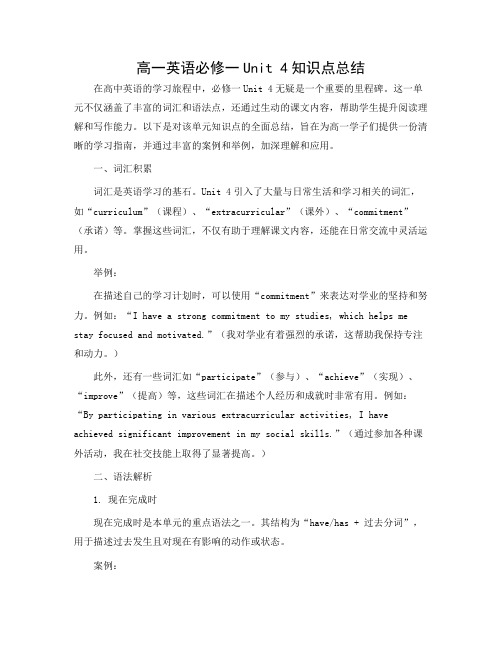
高一英语必修一Unit 4知识点总结在高中英语的学习旅程中,必修一Unit 4无疑是一个重要的里程碑。
这一单元不仅涵盖了丰富的词汇和语法点,还通过生动的课文内容,帮助学生提升阅读理解和写作能力。
以下是对该单元知识点的全面总结,旨在为高一学子们提供一份清晰的学习指南,并通过丰富的案例和举例,加深理解和应用。
一、词汇积累词汇是英语学习的基石。
Unit 4引入了大量与日常生活和学习相关的词汇,如“curriculum”(课程)、“extracurricular”(课外)、“commitment”(承诺)等。
掌握这些词汇,不仅有助于理解课文内容,还能在日常交流中灵活运用。
举例:在描述自己的学习计划时,可以使用“commitment”来表达对学业的坚持和努力。
例如:“I have a strong commitment to my studies, which helps me stay focused and motivated.”(我对学业有着强烈的承诺,这帮助我保持专注和动力。
)此外,还有一些词汇如“participate”(参与)、“achieve”(实现)、“improve”(提高)等,这些词汇在描述个人经历和成就时非常有用。
例如:“By participating in various extracurricular activities, I have achieved significant improvement in my social skills.”(通过参加各种课外活动,我在社交技能上取得了显著提高。
)二、语法解析1. 现在完成时现在完成时是本单元的重点语法之一。
其结构为“have/has + 过去分词”,用于描述过去发生且对现在有影响的动作或状态。
案例:小李在英语课上被问到:“Have you finished your homework?”(你完成作业了吗?)小李回答:“Yes, I have finished it.”(是的,我已经完成了。
人教版高一英语必修一unit4知识点讲解

人教版高一英语必修一unit4知识点讲解Unit 4 Knowledge Points ExplanationUnit 4 of the People's Education Edition for Grade 11 English textbook covers various knowledge points related to the theme of "Earthquakes". In this unit, students will acquire a deeper understanding of earthquake-related vocabulary, grammar structures, and reading skills. Without further ado, let us delve into the essential concepts covered in this unit.I. Vocabulary1. Earthquake-related vocabulary: In this section, students will learn key earthquake vocabulary such as tremor, magnitude, epicenter, seismograph, and aftershock. It is crucial to have a firm grasp of these terms to effectively communicate and understand information about earthquakes.2. Synonyms and antonyms: This module aims at enhancing students' lexical range by exploring synonyms and antonyms of common words. By learning synonyms and antonyms, students canimprove their ability to express ideas in a more nuanced and precise manner.II. Grammar1. Passive voice: Unit 4 focuses on the use of passive voice. By understanding and practicing the construction of passive sentences, students can accurately convey earthquake-related information, such as "The city was devastated by the earthquake."2. Attributive clauses: This section introduces attributive clauses, or relative clauses, which provide additional information about a noun. Students will learn how to use relative pronouns (who, which, that) to modify nouns in their writing and speaking.III. Reading Skills1. Skimming and scanning: Skimming and scanning are two essential reading skills that help students quickly locate relevant information in a text. Students will learn how to skim and scan passages about earthquakes to extract key details and main ideas efficiently.2. Understanding text structure: This module focuses on recognizing different text structures, such as cause and effect, compare and contrast, and problem and solution. By familiarizing themselves with these structures, students can better understand the organization of a text and extract relevant information more effectively.IV. Writing Skills1. Descriptive writing: In this part, students will develop their descriptive writing skills by describing earthquakes and their impact. They will learn how to use vivid language and sensory details to create a more engaging and informative description.2. Paragraph organization: This module emphasizes the importance of coherent paragraph organization. Students will learn how to structure paragraphs logically, ensuring a smooth flow of ideas and providing clear topic sentences and supporting details.V. Listening and Speaking Skills1. Note-taking in lectures: This section focuses on effective note-taking skills during lectures. Students will practice listening to earthquake-related information and summarize the key points in their own words.2. Group discussions: Students will participate in group discussions on various topics related to earthquakes. This activity aims to improve their ability to express opinions, engage in meaningful conversations, and collaborate with peers.In conclusion, Unit 4 of the People's Education Edition for Grade 11 English provides comprehensive knowledge points that enable students to expand their vocabulary, enhance grammar skills, improve reading comprehension, develop writing proficiency, and strengthen listening and speaking abilities. By mastering these knowledge points, students will be better equipped to comprehend and discuss earthquake-related topics, both academically and in real-life situations.。
高一必修一unit4知识点
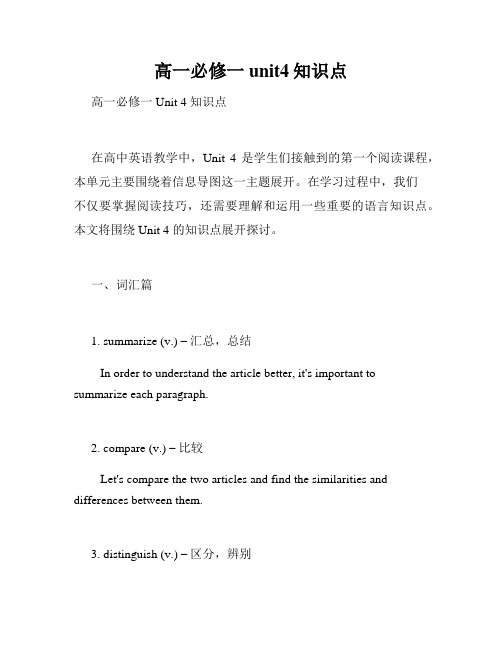
高一必修一unit4知识点高一必修一 Unit 4 知识点在高中英语教学中,Unit 4 是学生们接触到的第一个阅读课程,本单元主要围绕着信息导图这一主题展开。
在学习过程中,我们不仅要掌握阅读技巧,还需要理解和运用一些重要的语言知识点。
本文将围绕 Unit 4 的知识点展开探讨。
一、词汇篇1. summarize (v.) –汇总,总结In order to understand the article better, it's important to summarize each paragraph.2. compare (v.) –比较Let's compare the two articles and find the similarities and differences between them.3. distinguish (v.) –区分,辨别It is difficult to distinguish between twins because they look so similar.4. distinguish…from… –将…与…区分开来It is important to distinguish fact from fiction when reading news sources.5. classify (v.) –分类,归类The books in the library are classified according to genre and author.6. edit (v.) –编辑,剪辑The editor will edit your article before it is published.7. revise (v.) –修订,修改Before submitting the essay, make sure to revise and correct any grammatical errors.8. transfer (v.) –转移,转换The teacher encouraged the students to transfer their knowledge from the textbook to real-life situations.二、语法篇1. used to do sth. –过去常常做某事(现在不做了)I used to play basketball every Sunday, but now I prefer swimming.2. be used to –习惯于After living in the city for a year, I am used to the noise and fast pace of life.3. be/get accustomed to –习惯于She got accustomed to waking up early after a week of early morning meetings.4. be/get used to –习惯于After wearing glasses for a month, she finally got used to them.5. prefer…to… –更喜欢…而不是…I prefer watching movies to reading books because they are more visually stimulating.6. instead of –代替,而不是Instead of going out, I decided to stay at home and work on my homework.7. neither…nor…–既不…也不…Neither John nor Jane enjoys playing video games.8. both…and… –既…and…Both the teachers and the students participated in the school's charity event.三、阅读理解在阅读理解中,我们需要掌握一些常用的阅读技巧,如略读、精读、找关键词等。
英语必修一unit4知识点总结_高三数学知识点总结
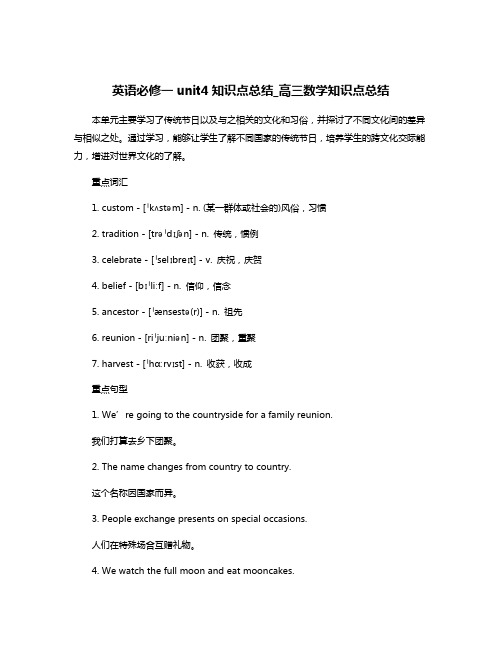
英语必修一unit4知识点总结_高三数学知识点总结本单元主要学习了传统节日以及与之相关的文化和习俗,并探讨了不同文化间的差异与相似之处。
通过学习,能够让学生了解不同国家的传统节日,培养学生的跨文化交际能力,增进对世界文化的了解。
重点词汇1. custom - [ˈkʌstəm] - n. (某一群体或社会的)风俗,习惯2. tradition - [trəˈdɪʃən] - n. 传统,惯例3. celebrate - [ˈselɪbreɪt] - v. 庆祝,庆贺4. belief - [bɪˈliːf] - n. 信仰,信念5. ancestor - [ˈænsestə(r)] - n. 祖先6. reunion - [riˈjuːniən] - n. 团聚,重聚7. harvest - [ˈhɑːrvɪst] - n. 收获,收成重点句型1. We’re going to the countryside for a fa mily reunion.我们打算去乡下团聚。
2. The name changes from country to country.这个名称因国家而异。
3. People exchange presents on special occasions.人们在特殊场合互赠礼物。
4. We watch the full moon and eat mooncakes.我们看满月,吃月饼。
知识点延伸1. 学生可以自主选择一个国家的传统节日,通过调查了解该节日的由来、习俗、传统和庆祝方式,并进行小组汇报。
2. 班级可以组织“国际文化节”,各自代表一个国家,并展示该国家的传统文化、风俗和美食。
3. 带领学生学唱一首国外的传统节日歌曲,加深对当地文化的了解。
高三数学知识点总结本单元主要学习了向量的基本概念、向量的线性运算和向量的数量积。
通过学习,能够让学生了解向量的性质和运算规律,并能够应用向量解决实际问题。
新人教版高一英语必修一第四单元知识点

v. 毁坏;毁掉;使破产
I was ruined by the law case. 我被那场官司搞得倾家荡产。 ruin oneself 毁掉自己 ruin one’s hopes 使某人希望破灭
【拓展】destroy, ruin, damage的区别 ①damage指部分“损坏”、“破坏”或指使用价值有所降低。它可以用
灭”解,也可以指希望、计划等打破。 His hope of being a writer was destroyed. 他想成为一个作家的希望破灭了。
③ruin则表示破坏严重,以致不能修复,但这种破坏不像destroy那样毁灭某 物,而是强调致使该物的使用价值发生了问题。用作动词时,它
作“使毁灭”、“使崩溃”解;用作名词时,它表示“毁灭”、“瓦解”、 “废墟”等抽象概念。
这三个词都是形容词: electric 多指用电作为动力的。 electrical表示与电力生产或使用相关的。 electronic电子的,电子器件的
作动词,也可以用作名词,用作名词时常与to something 连用。 Hundreds of houses in the area were damaged by the storm. 暴风雨毁坏了这
个地区数以百计的房屋。 ②destroy只能用作动词,指彻底破坏,以致不可能修复,常作“破坏”、“毁
【随堂练习】汉译英: 1. 看到邻居们如何对待孩子,我感到震惊。 _____________________________________________________________
2. 他妻子去世的消息对他打击太大了。 _____________________________________________________________
人教版高中英语必修一第四单元

学生学习效果评价
课堂参与度: 观察学生在课 堂上的表现, 如回答问题、 参与讨论等。
作业完成情况: 检查学生的作 业完成情况, 包括质量、数 量和完成时间 等。
测试与考试成 绩:通过测试 和考试评估学 生对所学知识 的掌握程度。
学习进步与成长: 关注学生在学习 过程中的进步和 成长,如解决问 题的能力、批判
XX,a click to unlimited possibilities
汇报人:XX
目录
内容1:本单元主题是“人与自 然”,旨在引导学生关注环境保护 和可持续发展。
单元标题
内容3:本单元主题是“人与自 然”,将学习如何保护环境,实现 可持续发展。
添加标题
添加标题
添加标题
添加标题
内容2:本单元主题是“人与自 然”,通过学习,学生将了解自然 灾害及其对人类的影响。
了解词汇的词性、词义和用法
掌握短语的搭配和用法
能够运用所学词汇和短语进行 实际交流
语法结构
单元重点语法:定语从句
单元难点语法:同位语从 句
单元常用句型:强调句型
单元易错点:时态和语态 的混淆
课文内容与解析
课文主题:本单元课文主要围绕“人与自然”的主题展开,旨在培养学生的环保意识。
课文结构:本单元课文采用总分总的结构,先总述环保的重要性,再分别从不同角度介绍环保知识,最后总结全 文。
性思维等。
教师教学质量评估
教学目标是否 明确
教学内容是否 充实
教学方法是否 得当
教学效果是否 良好
教学反馈与改进建议
学生对教学内容的掌握情 况
教师教学方法的评估
课堂氛围和互动情况
作业和考试成绩分析
评价方式的选择与应用
人教版高一英语必修一第四单元知识点

人教版高一英语必修一第四单元知识点高中的英语知识点学习综合性比较强,那么在高一的时候,我们要注意把每个单元的英语知识点都整理好。
以下是小编给你推荐的高一英语必修一第四单元知识点,希望对你有帮助!英语必修一第四单元知识点一、语法The Attributive Clause(1)复习关系代词引导的定语从句关系代词在定语从句中作主语时,从句谓语动词的人称和数要和先行词保持一致。
1.who, whom, that这些词代替的先行词是人的名词或代词。
eg: Is he the man who/that wants to see you?(who/that在从句中主语)He is the man whom/that I met yesterday.(who/that在从句中宾语)2.Whose用来指人或物,(只用作定语,若指物,它还可以同of which互换)如:Please pass me the book whose cover is blue.3.which, that所代替的先行词是事物的名词或代词,在从句中可作主语,宾语等。
如:The book (which/that) my teacher lent me is very interesting.二、高频考点1.be(get) married 表示婚姻状态。
如:They are married.She got married to a doctor.如果要表示结婚的时间,可用表示行为动作的连系动词get。
When did he get married?He got married in 1997.如果是父母作主,把女儿“嫁”出去,也用marry,如:She married all her daughters.She married her daughters to a farmer.2.occur, happen, take place都含“发生”的意思。
- 1、下载文档前请自行甄别文档内容的完整性,平台不提供额外的编辑、内容补充、找答案等附加服务。
- 2、"仅部分预览"的文档,不可在线预览部分如存在完整性等问题,可反馈申请退款(可完整预览的文档不适用该条件!)。
- 3、如文档侵犯您的权益,请联系客服反馈,我们会尽快为您处理(人工客服工作时间:9:00-18:30)。
2. damage, ruin, destroy
①damage指部分“损坏”、“损害”、“破坏”或指使用价值有所降低。它可以用作动词,也可以用作名词,用作名词时常与to something连用。
如:The accident did a lot of damage to his car.
vt.毁灭;使破产
in ruins严重受损;破败不堪
suffering n.苦难;痛苦
extreme adj.极度的
injure vt.损害;伤害
△survivor n.幸存者;生还者;残存物
destroy vt.破坏;毁坏;消灭
brick n.砖;砖块
dam n.水坝;堰堤
track n.轨道;足迹;痕迹
frightening adj.令人恐惧的
congratulation n.祝贺;(复数)贺词
judge n.裁判员;法官
vt.断定;判断;判决
sincerely adv.真诚地;真挚地
express vt.表示;表达
n.快车;速递
outline n.要点;大纲;轮廓
headline n.报刊的大字标题
by the end of用于表示时间的场合到……结束的时候,用过去完成时态;
in the end意思“最后、终于
练习
The cold weather at last stopped____________ March.(at the end of)
Our hunt for a cheaper but larger house is at last ________.(at an end)
show honour to sb. / sth.
in honour of为了纪念
The monumen was built in honour of the dead in the war.
3. event名词,意为“(重要的、不同寻常的)事件”。
如:Leaving home was a major event in his life.
This is one of the most important events in the history of mankind.
event意思还有“(事先安排好的)演出,赛事,聚会”,“(体育比赛的)运动项目”等。
如:The meeting was an important social event.
翻译:不要以貌取人。
Don’t judge a man by his appearance
2. honour n./v.荣誉、尊敬、敬意、纪念
We should honour our parents.
= We should show honour to our parents.
honour sb. / sth.尊重某人/事
The 800 meters is not his best event.
4. end结束
常用短语:
at the end (of)在……末尾
by the end of到……为止
in the end最后,终于
come to an end完结
at the end of用于表示具体事物或场所的场合,它也可以用来表示比喻意;
raise:举起;使升起;提高;养育,饲养(可用于被动语态)
练习
He _____from his chair when the door bell rang.(rose)
Her job is _______ chickens.(raising)
Her temperature is still ______.(rising)
Unit 4 Earthquakes
Words list
earthquake n.地震
quake n.地震
right away立刻;马上
well n.井
△crack n.裂缝;噼啪声
vt. & 臭的;有臭味的
△farmyard n.农场;农家
pipe n.管;导管
If you go on with work, you’ll succeed _________.(in the end)
How many English words had you learned ____________ last term? (by the end of)
词语辨析
1. rise:升起;上升;上涨;提拔,晋升(不能用于被动语态)
useless adj.无用的;无效的;无益的
shock vt. & vi.(使)震惊;震动
n.休克;打击;震惊
rescue n. & vt.援救;营救
trap vt.使陷入困境
n.陷阱;困境
electricity n.电;电流;电学
disaster n.灾难;灾祸
dig out掘出;发现
bury vt.埋葬;掩埋;隐藏
②destroy只能用作动词,指彻底破坏,以致不可能修复,常作“破坏”、“毁灭”解,也可以指希望、计划等打破。
mine n.矿;矿山;矿井
miner n.矿工
shelter n.掩蔽;掩蔽处;避身处
a (great) number of许多;大量的
title n.标题;头衔;资格
reporter n.记者
bar n.条;棒;条状物
damage n. & vt.损失;损害
frighten vt.使惊吓;吓唬
frightened adj.受惊的;受恐吓的
burst vi. (burst, burst)爆裂;爆发
n.突然破裂;爆发
million n.百万
event n.事件;大事
as if仿佛;好像
at an end结束;终结
nation n.民族;国家;国民
canal n.运河;水道
steam n.蒸汽;水汽
dirt n.污垢;泥土
ruin n.废墟;毁灭
cyclist n.骑自行车的人
Key words
1.judge n.评委、裁判员、法官
He was a poor judge of man.他看人的能力很差。
The prisoner was taken to the judge.
他被带到了法官那儿。
v.断定、判断、判决
A blind man cannot judge colors.盲人不能判断颜色。
